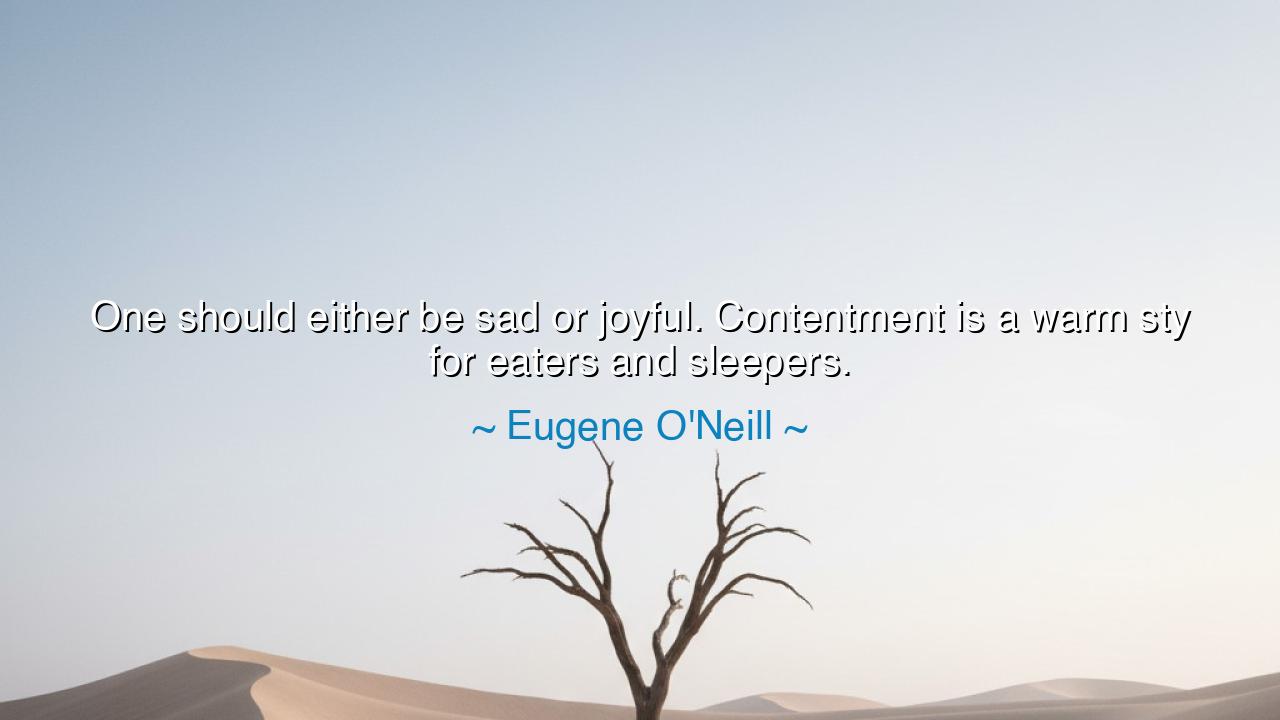
One should either be sad or joyful. Contentment is a warm sty for






In the fierce and penetrating words of Eugene O’Neill, the great dramatist of human struggle, there burns a defiant truth: “One should either be sad or joyful. Contentment is a warm sty for eaters and sleepers.” These words, as sharp as a blade and as enduring as stone, challenge the comfort-loving soul and awaken the fire of purpose within us. O’Neill, who plumbed the depths of human despair and exaltation alike, warns here against the dull middle ground—the stagnant state of contentment, where passion fades and the spirit forgets its hunger. To be alive, he says, is to feel deeply, to wrestle with sorrow or dance with joy, but never to settle in the half-life of comfort.
Eugene O’Neill, born of turmoil and tragedy, wrote from the depths of a heart that had known both agony and transcendence. The son of an actor and a mother addicted to morphine, he grew up amidst pain and theatrical brilliance. His plays—Long Day’s Journey Into Night, The Iceman Cometh, A Moon for the Misbegotten—are filled with characters who yearn, who fall, who rise again, forever seeking meaning in a world that both wounds and awakens them. When he speaks of contentment as a warm sty, he speaks with the authority of one who has seen life in its rawest form, who knows that the soul, like iron, must be forged in the heat of emotion to gain its strength.
To O’Neill, contentment is the death of creation. It is the quiet decay that follows when a person stops striving, when he trades the storms of the heart for the comfort of mediocrity. He likens it to a “sty,” a place of feeding and sleeping, where the body is full but the spirit is empty. In this he echoes the wisdom of the ancients, who taught that the soul thrives on struggle. Heraclitus said, “War is the father of all things.” It is not peace that gives birth to greatness, but the tension between joy and sorrow, hope and despair. A life of mere contentment, like still water, grows stagnant; but a life stirred by emotion, though turbulent, stays alive.
The truth of O’Neill’s words can be seen in the lives of those who have changed the world. Consider Vincent van Gogh, the painter whose heart burned too brightly for this world. He knew no contentment—only the searing sorrow of loneliness and the fleeting ecstasy of creation. His pain gave birth to beauty, his restlessness to vision. Had he sought comfort, his brush would have fallen silent, and the world would have been poorer for it. His life was not easy, but it was alive—and that, O’Neill would say, is the truest form of victory.
And yet, O’Neill’s challenge is not a call to perpetual torment, but to passion—to the full engagement of the soul. He does not glorify suffering for its own sake; rather, he insists that both sadness and joy are signs of being truly human. To feel deeply, to weep, to exult, to rage—these are proofs of life. The one who feels nothing, who hides in the “warm sty” of complacency, is safe perhaps, but also dead in spirit. For only through sorrow do we learn compassion, and only through joy do we learn gratitude. Both are sacred fires that keep the heart awake.
From this truth we may draw a timeless lesson: beware the comfort that dulls your edge. Comfort is the sweetest of poisons—it enters gently, promising rest, but it lulls the soul into forgetfulness. Strive always to remain alive to the pulse of existence, to risk the ache of disappointment for the chance of wonder. Let your days be full of feeling, whether bitter or sweet, for emotion is the heartbeat of purpose. The ancients knew this: the gods favored those who dared to strive, not those who merely endured.
So, O listener, take these words to heart. Do not seek the “warm sty” of contentment, but the wild freedom of the soul that dares to feel. When sorrow comes, welcome it as a teacher; when joy arrives, embrace it as a friend. Live not as an eater and sleeper, but as a seeker—as one who burns with life. For as Eugene O’Neill reminds us, it is better to weep and to sing than to sit in silence. To feel deeply is to be alive. And in the end, it is not the comfortable who are remembered, but the passionate—the ones who dared to wrestle with life until it revealed its truth.






AAdministratorAdministrator
Welcome, honored guests. Please leave a comment, we will respond soon